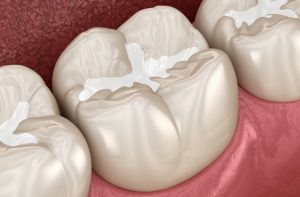Fissure Sealant

When eating, food trapped in the grooves and fissures of the tooth as well as plaque build up that is not properly cleaned and removed may cause decay of the tooth and will eventually pose a problem for the patient. In this case, when decay is formed and cavitation is present on the tooth, the dentist’s approach would warrant the removal of the decayed part of the tooth and the use of filling materials.
In more complex cases, when decay has spread and filling materials would no longer suffice to save the tooth, more invasive approaches are used— the tooth will either be subjected to root canal treatment or worse, would have to be removed.
As they always say, “Prevention is better than cure”. To effectively prevent tooth decay, dental professionals in Identity Dentistry recommend treating the tooth with sealants.
The application of sealants is a non-invasive, conservative procedure that “seals” the grooves, pits, and fissures of the tooth. These are areas where decay starts as food and bacteria easily lodges onto these surfaces and are sometimes not reached or properly cleaned with toothbrushing.
With the sealant, further decay and future damage are prevented.
The sealant is of a liquid consistency making it easy for your Canberra dentist to spread and pack it onto the grooves, pits, and fissures on the tooth. When your dentist has ensured all decay-prone areas are covered, he allows it to harden.
When set, this sealant forms a protective layer on the tooth and there will no longer be any surface for bacteria to lodge and eventually cause tooth decay.
The application of a sealant is an effective preventive and management approach that is especially advised for younger patients. Children tend to consume more sweets and have an irregular dental hygiene routine making them more susceptible to bacteria causing tooth decay.
Identity Dentistry professionals aim to make sure that all their patients receive the best dental care possible and for young patients, sealants promise a healthier oral cavity as they grow older.
Aside from sealants placed on healthy teeth to prevent future tooth decay, these are also used to inhibit the progression of small carious lesions. Upon check-up, when the dentist sees minute decays on the tooth enamel, instead of removing and using dental filling materials, sealants are used so the decay no longer spreads and the tooth remains healthy.
Fortunately, we now live in a world where there are so many advancements in the practice of Dentistry and one of them is the use of fissure sealant. However, this is one of the most underutilized treatments.
Fissure sealants have many advantages that patients overlook. This helps with preventing and inhibiting tooth decay.
When properly applied and with good oral hygiene as well as regular dental visits and routinary cleaning, fissure sealant may last for many years. Also, with it being a preemptive treatment, it reduces future costs from fillings, tooth extraction, dentures, or dental implants that come with unmanaged tooth decay.


